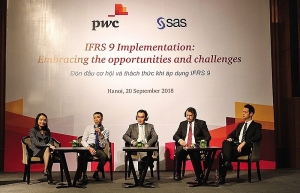Business transparency to be improved through IFRS
 |
| IFRS is already applied in more than 120 markets around the world, Photo: Shutterstock |
To prepare for the adoption of International Financial Reporting Standards (IFRS), expected to be made compulsory after 2025, a number of businesses have started to study the standards to update knowledge for tenants.
The three subjects that have to apply IFRS are listed companies, parent companies which have to build consolidated financial statement reports with their subsidiaries overseas, and parent companies linked to state-owned corporations.
Tuong Quynh Huong, deputy general director of Dai An JSC - investor of Lai Cach Industrial Park (IP) and Dai An IP in the northern province of Hai Duong, said, “The mandatory requirement to adopt IFRS will help foreign-invested enterprises in Vietnam and tenants in our IPs to ensure their transparency, prestige, professionalism and opportunities to compete in the global market.”
Besides that, it also helps to decrease the foreign investors’ expenditure for the conversation from the current Vietnam Accounting Standards to IFRS to consolidate with their parent companies overseas, Huong said.
“Around 90 per cent of tenants in Dai An IP are foreign-invested enterprises, so enhancing their knowledge of IFRS is important. We will organise training programmes with the participation of experts in finance and tax to provide updated information and regulations for our tenants in terms of tax, accounting, customs, finance, and marketing, among others,” Huong said.
In early August, Dai An cooperated with the Vietnam IP Finance Association to organise a training programme on IFRS and tax inspection trends with the participation of nearly 100 representatives of manufacturing facilities in Dai An IP.
Meanwhile Nguyen Thi Thuy, training director at the AudiCare Vietnam Training Centre, said a business applying IFRS will be more transparent about its liabilities and assets, thereby helping investors accurately assess risks and profit potential.
“When liabilities and assets are presented clearly and in detail according to international standards, investors will have a comprehensive and honest view of the financial situation of the business. Investors can easily compare these financial indicators with other businesses in the same industry or region, thereby making smarter and more effective decisions,” Thuy said.
Thuy added that reports meeting IFRS should allow comparisons between different entities and accounting periods, and should clearly disclose information that is material to the economic decisions of users. The information in the report should be verified to ensure its accuracy and to accurately reflect economic phenomena.
IFRS is widely applied in more than 120 countries and territories around the world, and Vietnam approved a roadmap to implement the system in 2023. The roadmap is divided into the preparation phase (2020-2021), the voluntary adoption phase (2022-2025), and the mandatory adoption phase from 2025 onward.
At present, the adoption still remains unpopular with enterprises in Vietnam because few firms have a thorough understanding of the system, while there are still gaps in compliance with financial reporting standards.
The statistics published by the Finance and Accounting Department under the State Bank of Vietnam show that in the credit sector in particular, the number of credit institutions that have developed it accounts for just over half (55.2 per cent), with 36.8 per cent having a methodology for some categories and 18.4 per cent having a methodology for all categories.
However, 45 per cent of credit institutions have not developed a method for assessing the fair value of financial instruments.
In addition, according to the same department, around one-third of credit institutions agreed that they had identified, assessed, and were ready for important changes when applying IFRS. However, the number of credit institutions that were hesitant or disagreed accounted 47.1 per cent and 19.5 per cent respectively.
Thuy from Audicare said applying IFRS can be complicated and costly in terms of training and changes in the system and constant compliance.
“In addition, adjusting to this system to ensure appropriateness to existing legal frameworks is not an easy job. The current system has 26 standards, while IFRS has 41. It might take enterprises at least three or four years of training to prepare data for their first IFRS report,” Thuy added.
 | Banks prepare for IFRS 9 standards PwC Vietnam and SAS Malaysia last week held workshops in Hanoi and Ho Chi Minh City to support Vietnamese banks in preparing for the implementation of International Financial Reporting Standards (IFRS) 9. |
 | Gathering momentum in IFRS adoption Following March’s promulgation of Decision No.345/QD-BTC by the Ministry of Finance approving the scheme for applying International Financial Reporting Standards in Vietnam, a new survey has revealed that more than 50 per cent of respondents have applied or are preparing to convert to the system. |
 | Training and cooperation at heart of IFRS compliance Preparation for the conversion to and adoption of International Financial Reporting Standards (IFRS) by Vietnam-based companies is one of the most important steps towards propelling economic development with greater transparency. However, various challenges still colour the landscape. |
 | Businesses lining up for IFRS conversion Vietnamese businesses’ conversion and adoption of the International Financial Reporting Standards are among the most significant measures towards pushing for greater transparency, particularly for publicly traded entities, according to a number of senior executives. |
What the stars mean:
★ Poor ★ ★ Promising ★★★ Good ★★★★ Very good ★★★★★ Exceptional
Related Contents
Latest News
More News
- A golden time to shine within ASEAN (February 19, 2026 | 20:22)
- Vietnam’s pivotal year for advancing sustainability (February 19, 2026 | 08:44)
- Strengthening the core role of industry and trade (February 19, 2026 | 08:35)
- Future orientations for healthcare improvements (February 19, 2026 | 08:29)
- Infrastructure orientations suitable for a new chapter (February 19, 2026 | 08:15)
- Innovation breakthroughs that can elevate the nation (February 19, 2026 | 08:08)
- ABB Robotics hosts SOMA Value Provider Conference in Vietnam (February 19, 2026 | 08:00)
- Entire financial sector steps firmly into a new spring (February 17, 2026 | 13:40)
- Digital security fundamental for better and faster decision-making (February 13, 2026 | 10:50)
- Aircraft makers urge out-the-box thinking (February 13, 2026 | 10:39)

 Tag:
Tag:













 Mobile Version
Mobile Version